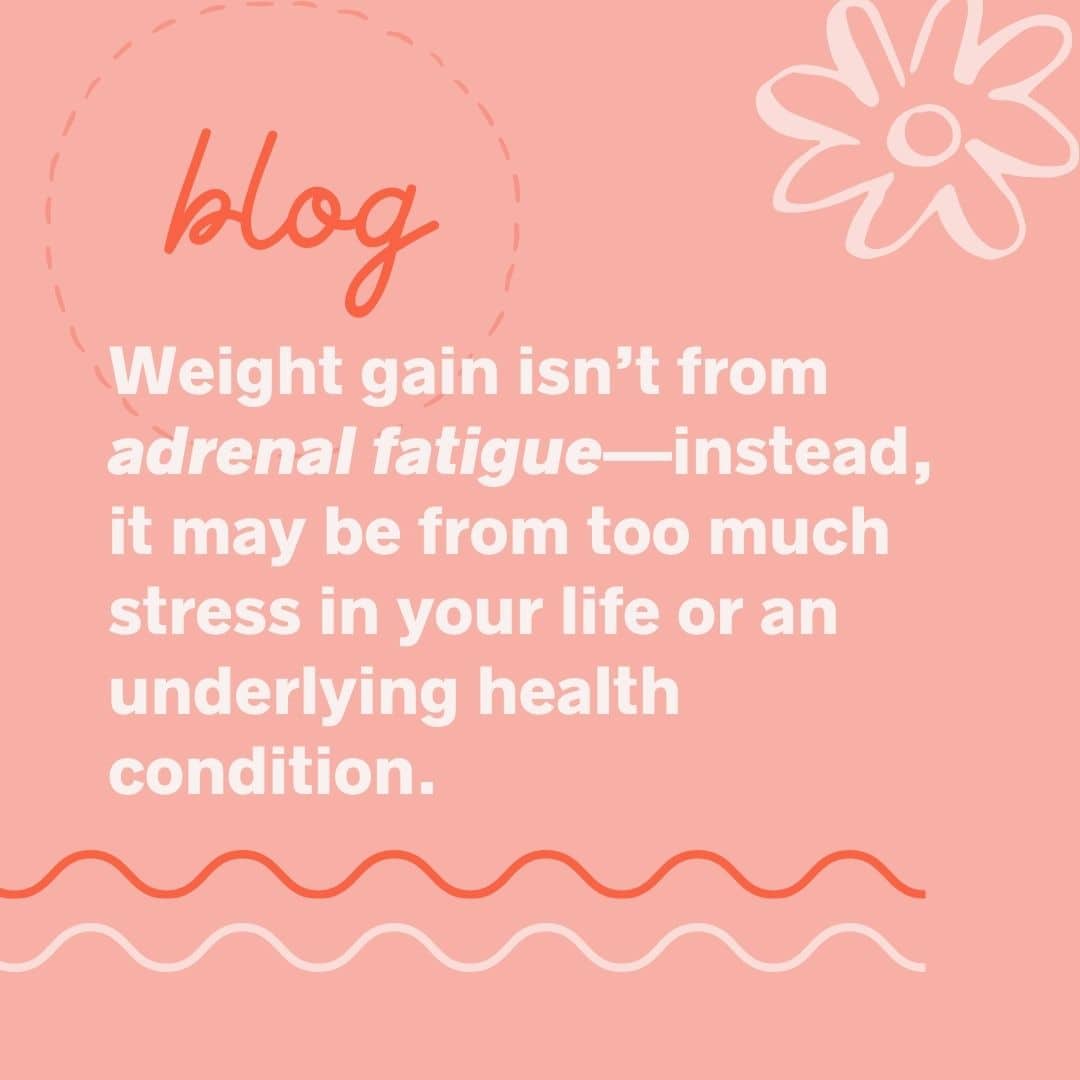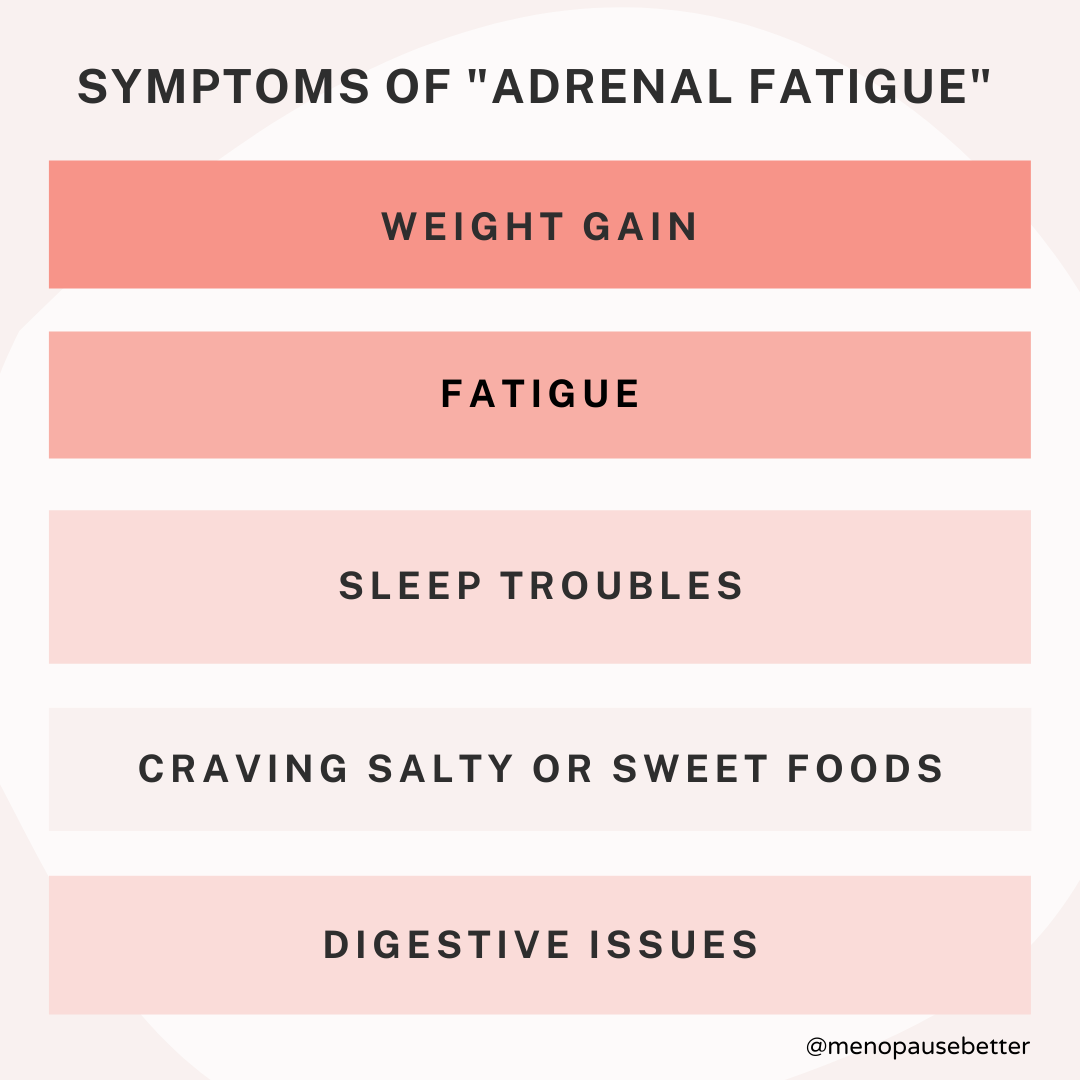Adrenal Fatigue and Weight Gain
Are you experiencing excessive fatigue, sleeping problems, trouble concentrating, and weight gain? Are you overwhelmed by stress? Many women with these complaints are told the cause is adrenal fatigue.
Table of Contents
ToggleIn this article, we will discuss adrenal fatigue and weight gain, including causes and treatment options.
What Is Adrenal Fatigue?
The adrenal glands are important because they’re responsible for producing, secreting, and regulating specific hormones in your body. For example, your body uses hormones like cortisol to manage stress in the body.
The term “adrenal fatigue” is based on the idea that your adrenal gland has the capacity to fatigue. This term is used to explain a group of symptoms that occur in people under long-term mental, emotional, or physical stress.
The idea underlying adrenal fatigue is that constant stress puts a burden on the adrenal glands to produce cortisol and the glands burn out. As a result, someone may experience generalized symptoms, including weight gain, fatigue, trouble falling asleep or waking up, and a need for stimulants like caffeine to get through the day (1).
Supporters of adrenal fatigue say that you’re more likely to develop this condition if you have a stressful job, work the night shift, are a working student, or are a single parent. Symptoms occur when constant stress overwhelms the adrenal glands and can’t keep up with the body’s needs (2).
However, adrenal glands don’t simply tire out because of too much stress.
Is Adrenal Fatigue Real?

No scientific proof exists to support adrenal fatigue as a true medical condition. Adrenal fatigue is a lay term applied to a collection of nonspecific symptoms, such as body aches, fatigue, nervousness, sleep disturbances, and weight changes.
With the fast-paced demands of modern life making many people feel constantly stressed out and sleep-deprived, it’s easy to understand the appeal of a diagnosis that promises an explanation and treatment to reverse their feelings of fatigue.
But the problem with the term adrenal fatigue is that it is used to describe a group of symptoms when nothing else can be used to explain it.
Doctors are concerned that if you are told you have this condition, the real cause of your symptoms may not be found or treated correctly. Often, patients are not suffering from adrenal fatigue but other issues such as mild anemia, thyroid problems, fibromyalgia, depression, and menopause (3).
Last, the reported treatment for adrenal fatigue may be expensive since insurance companies are unlikely to cover the costs.
What Are the Symptoms of Adrenal Fatigue?
Many symptoms are associated with adrenal fatigue. For example (4):

- Fatigue
- Difficulty waking up in the morning
- Higher levels of energy in the evening
- Insomnia
- Difficulty handling stress
- Body aches
- Unexplained weight gain
- Unexplained weight loss
- Digestive issues
- Low blood pressure
- Lightheadedness
- Loss of body hair
- Skin discoloration
- Trouble concentrating
- Craving salty or sweet foods
- Consuming too much caffeine
- A weak immune system
How Do Adrenal Fatigue and Weight Gain Relate?
Experiencing adrenal fatigue may be linked to chronic stress or other underlying issues, such as hypothyroidism, hormone imbalance, anemia, menopause, depression, anxiety, or chronic fatigue.
All of these scenarios are associated with weight gain.
For example, high levels of the stress hormone cortisol can result in overeating and increased belly fat. An increase in appetite can lead to weight gain.
When you’re under stress or feeling burned out, you may find it harder to eat healthily. Also, during times of particularly high stress, you may eat in an attempt to fulfill your emotional needs. Emotional eating causes an intake of more high-fat, high carbohydrate foods. As a result, this can lead to weight gain (5).
Last, issues like hypothyroidism, menopause, and depression are linked to weight gain.
Diagnosing Adrenal Fatigue
Patients with adrenal fatigue take saliva tests for cortisol. Saliva tests are not reliable.
It’s frustrating to have persistent symptoms your doctor can’t readily explain. But accepting a medically unrecognized diagnosis may leave the real cause undiagnosed while it continues to take its toll.
Therefore, doctors recommend taking a careful history and investigating the causes of each symptom to exclude more serious disorders.
For example, some symptoms associated with adrenal fatigue — dizziness on standing, light-headedness, brain fog, and salt craving — may be related to low aldosterone (3).
After ruling out possible endocrine disorders, your doctor can refer you to other specialists, including urologists, cardiologists, rheumatologists, allergists/immunologists, and infectious disease physicians. These physicians can help get to the root of the problem.
Causes of Adrenal Fatigue and Weight Gain
Causes of adrenal fatigue and weight gain may be lifestyle-related or issues resulting from an undiagnosed condition.
Many poor lifestyle choices can result in adrenal fatigue and weight gain. For example, couch potato syndrome means one fatigue easily if they don’t exercise. Others may have a ‘hard mentality’ life and not take proper care of themselves through exercise, sleep, or proper diet (3).
Additionally, working at a stressful job, taking on too many burdens, or hanging around stressful people, can lead to not taking proper care of yourself. All of these lifestyles can lead to negative symptoms, including weight gain.
Other causes of weight gain may be related to untreated underlying issues like hypothyroidism, menopause, or mental illness.
Treatment for Adrenal Fatigue and Weight Gain
There are a few different options for treating Adrenal Fatigue and Weight Gain.
Work With a Multidisciplinary Team
Because adrenal fatigue isn’t a real medical diagnosis, it’s important to work with specialized doctors, therapists, and dietitians to treat the root cause of your symptoms and provide relief. Treatment includes diet, exercise, lifestyle, stress reduction, supplements, and medication plans depending on your symptoms and diagnosis (1).
Stress Management
Stress is a big driver of adrenal fatigue symptoms and weight gain. It’s important to have daily behaviors and habits to help manage stress. For example (6):
- Recognize the warning signs of stress, such as anxiety, irritability, and muscle tension.
- Before eating, ask yourself why you’re eating — are you truly hungry, or do you feel stressed or anxious?
- Eat a healthy, balanced diet to add energy to your day
- Identify comfort foods and keep them out of your home or office.
- Keep a record of your behavior and eating habits to look for patterns and connections — and then figure out how to overcome them.
- Learn problem-solving skills so that you can anticipate challenges and cope with setbacks.
- Practice relaxation skills, such as yoga, stretching, massage, deep breathing, or meditation.
- Engage in regular physical activity or exercise.
- Get adequate sleep.
- Hang out with supportive friends and family.
- Take up meditation.
Diet Management
Eating too much sugar, processed foods, or calories can lead to weight gain and fatigue.
It’s important to work with a registered dietitian to learn how to eat a healthy diet. For example (7):
- Eat whole foods
- Reduce intake of processed or fast foods
- Eat protein, carbohydrates, fat, and vegetables at each meal to feel satiated
- Have 1-2 cups of fruit per day
- Eat 2-3 cups of vegetables per day
- Replace sugary drinks with water
- Limit alcohol
- Reduce unnecessary snacking
- Eat slowly and mindfully in peaceful environments
- Avoid eating to soothe negative emotions
- Eat when you are hungry and stop when you feel full
Simple, consistent diet tips can lead to long-term, sustainable weight loss.
Exercise

Exercise can help with weight loss, reduce appetite, and relieve stress.
One study showed that working out for 300 minutes per week versus 150 minutes per week leads to weight loss. Working out for 300 minutes per week also changes the hormone leptin, a hormone that reduces appetite (8).
Find your favorite exercise and make a habit of doing it 5 times per week for 60 minutes.
Medications for Adrenal Fatigue
Sometimes, patients who have been misdiagnosed with adrenal fatigue are prescribed prednisone (a type of steroid) to replace the cortisol that is thought to be missing.
But patients experience no benefits from taking these medications. In fact, taking prednisone can result in negative side effects and could ultimately even suppress your body’s own ability to produce cortisol (1).
Work with your doctor to receive an adequate diagnosis for your issue. Your doctor will work with you specifically on your symptoms and condition and provide proper medication.
Summary
Adrenal fatigue may not be a real diagnosis, but the symptoms you’re experiencing are real and require adequate diagnosis and treatment.
If you’re experiencing weight gain as a major symptom, be sure to focus on relieving stress, eating balanced meals, exercising, and treating the underlying issue of your symptoms.
“Adrenal Fatigue and Weight Gain” was written by Registered Dietitian Becky Rashidifard. Reviewed/edited by Su-Nui Escobar, DCN, RDN, FAND

Dr. Su-Nui Escobar, a Registered Dietitian/Nutritionist in Miami, FL, is dedicated to empowering women in perimenopause and menopause to live healthier, more satisfying lives.
With a doctorate in clinical nutrition from the University of North Florida, she has expertise in menopause and weight loss, including the unique challenges faced by those on weight loss medications.
Su-Nui’s passion for her field is evident in her previous role as the Academy of Nutrition and Dietetics spokesperson.


